Evil Does Not Exist (2023): a beautiful and simple ecological drama | un drama ecológico hermoso y sencillo
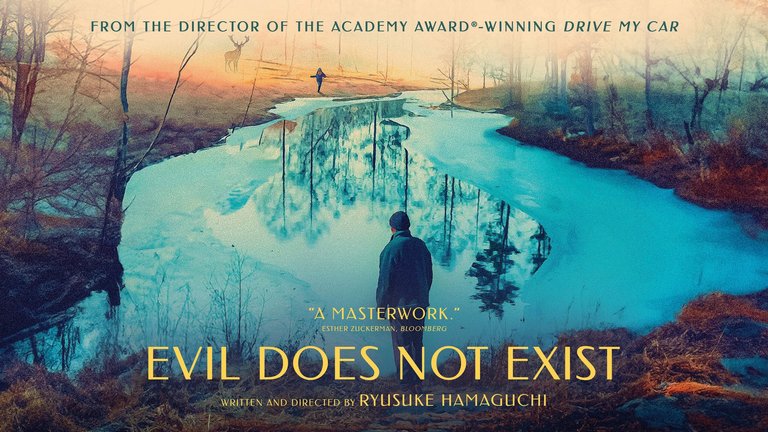
One of the limitations that those of us who love international cinema have, especially those of us who live in the third world, is the different release dates of these films across the globe, since unfortunately it seems that Latin America is the last corner of the world where films from Eastern Europe and Asia reach. Evil Does Not Exist by Ryûsuke Hamaguchi was released in September 2023 in Venice and then in April of this year in Japan, but I had to wait until August 2024, that is, almost a year since its initial release, to be able to see it in a movie theater here in Chile.
Una de las limitantes que tenemos quienes amamos el cine internacional, especialmente quienes vivimos en el tercer mundo, son las diferentes fechas de estreno de esas películas a lo largo y ancho del globo, ya que desafortunadamente pareciera que latinoamérica es el último rincón del mundo al que llegan las películas de Europa del Este y de Asia. Evil Does Not Exist de Ryûsuke Hamaguchi se estrenó en Septiembre de 2023 en Venecia y luego en Abril de este año en Japón, pero tuve que esperar hasta Agosto de 2024, es decir, casi un año desde su estreno inicial, para poder verla en una sala de cine acá en Chile.
This rural and naturalistic drama with thriller overtones begins with the story of Takumi, a man who lives in a village outside Tokyo and who carries out different tasks inherent to country life such as cutting wood or collecting water from the river. Takumi lives with Hana, his daughter of about eight or nine years old, with whom he goes for walks in the woods near his cabin where they can see and identify larches, oaks, cherry trees, pines and even see some deer in their natural habitat. Up to there everything is very serene and routine, but the lives of father and daughter, as well as those of the other inhabitants of the village, will be shaken when they find out that there is a company developing a Glamping project in the area. For those who haven't heard of it, the term glamping refers to a type of accommodation that combines luxury with nature (glamour + camping) and that has become fashionable in various parts of the world, especially on the outskirts of Tokyo. The idea behind this venture is to provide comfortable escapes to nature and rural surroundings for the residents of the capital. However, the development of the project and everything involved in setting up the site will not only bring about changes to the landscape but also to the lives of the locals. Where will the site be set up? Where will the wastewater be dumped? How many people will work there? How will this affect the residents? It's possible that the project will attract more tourists and that will translate into money for local businesses, but there are many more things to consider.
Este drama rural y naturalista con tintes de thriller, comienza con la historia de Takumi, un hombre que vive en un poblado a las afuera de Tokyo y que lleva a cabo diferentes tareas inherentes a la vida en el campo como cortar leña o recoger agua del río. Takumi vive con Hana, su hija de unos ocho o nueve años, con quien sale a pasear por los bosques cercanos a su cabaña en donde pueden ver e identificar alerces, robles, cerezos, pinos e incluso ver algunos corzos en su hábitat natural. Hasta allí todo es muy sereno y rutinario, pero las vidas de padre e hija, igual que las de los demás habitantes del poblado, se verán sacudidas cuando se enteren de que existe una empresa desarrollando un proyecto de Glamping en la zona. Para quienes no lo hayan oído, el término glamping hace referencia a un tipo de hospedaje que combina el lujo con lo natural (glamour + camping) y que se han puesto de moda en varias partes del mundo, especialmente en las afueras de Tokyo. La idea de esta empresa es que los habitantes de la capital hagan escapadas cómodas a la naturaleza y disfruten de un ambiente rural, pero el desarrollo del proyecto y todo lo que implica la instalación del lugar, provocará cambios no sólo en el paisaje sino también en la vida de los lugareños, ¿dónde instalarán el lugar? ¿a dónde vertirán las aguas servidas? ¿cuánta gente trabajará allí? ¿cómo afectará eso a los residentes? Es posible que el proyecto atraiga más turistas y eso se traduzca en dinero para los negocios locales, pero hay muchas más cosas que considerar.
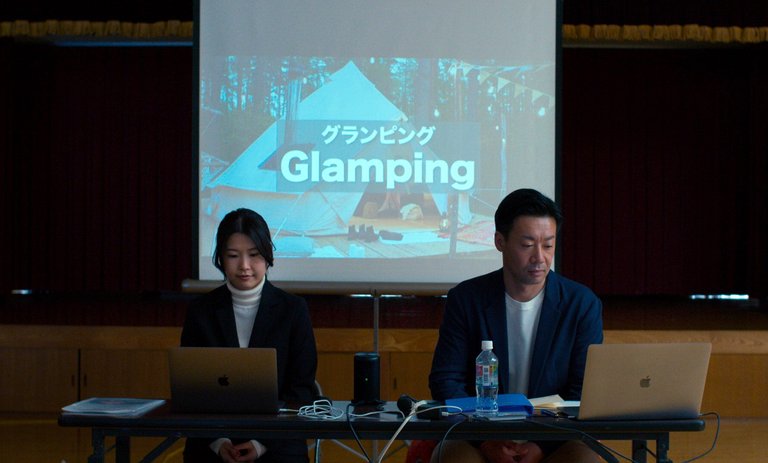
For this reason, the company in charge of building the glamping site sends two representatives to the village to have a meeting with the locals, where the representatives become aware of the challenges they face and the importance of environmental balance for the inhabitants of the village. We are not talking about inconveniences or lifestyle, but about a matter of deep respect for nature, the river, the trees, wild animals and the entire ecosystem.
Por eso, la empresa a cargo de la construcción del glamping envía dos representantes al pueblo para tener una reunión con los locales, en donde los emisarios se dan cuenta de los desafíos a los que se enfrentan y de la importancia que tiene el equilibrio ambiental para los habitantes del poblado. No estamos hablando de incomodidades o estilo de vida, sino de un tema de profundo respeto por la naturaleza, el río, los árboles, los animales salvajes y todo el ecosistema.
From the first shots - almost three minutes of treetops seen from the ground - this drama written by the director himself puts the focus on nature. Trees, mountains, wild animals and lots of snow - it's winter - are seen from different angles and by different people throughout the film, generating images that are as powerful as they are peaceful. The serenity of rural life, the balance of nature when man doesn't intervene or remains at a respectful distance, and the weak light of winter days, provoke in the spectator a feeling of peace, of calm, which contrasts with some city shots or some somewhat superfluous conversations that some of the characters have. But what at first seems to be nothing more than an ecological drama or a condominium meeting in the countryside, towards the end of the film turns into an overwhelming thriller that culminates in a somewhat cryptic scene. Is it a symbolic scene? And if so, what does it symbolize? Did what we saw really happen? And what about what we didn't see on screen? It's inevitable to finish the film and wonder what that ending means and then feel the need to watch it again to see if a second look, this time even more attentive and knowing the outcome, can shed some light on what Ryûsuke Hamaguchi meant with that last scene.
Desde las primeras tomas - casi tres minutos de copas de árboles vistas desde el suelo - este drama escrito por el propio director pone su foco en la naturaleza. Árboles, montañas, animales salvajes y mucha nieve - es invierno - son vistos desde diferentes ángulos y por diferentes personas a lo largo de toda la película generando unas imágenes tan poderosas como apasibles. La serenidad de la vida rural, el equilibrio de la naturaleza cuando el hombre no la interviene o se mantiene a un respetuoso margen y esa débil luz de los días invernales, provocan en el espectador una sensación de paz, de calma, que contrasta con algunas tomas citadinas o algunas conversaciones un poco superfluas que tienen algunos de los personajes. Pero lo que en un principio pareciera no pasar de un drama ecológico o de una reunión de condominio en el campo, hacia el final de la película se transforma en un thriller agobiante que culmina en una escena algo críptica, ¿es una escena simbólica? Y si es así, ¿qué simboliza? ¿realmente sucedió lo que vimos? ¿y qué hay de lo que no vimos en pantalla? Es inevitable terminar la película y preguntarse qué significa ese final y luego sentir la necesidad de volver a verla para ver si una segunda mirada, esta vez aún más atenta y conociendo el desenlace, puede brindarnos alguna luz sobre lo que quiso decir Ryûsuke Hamaguchi con esa última escena.
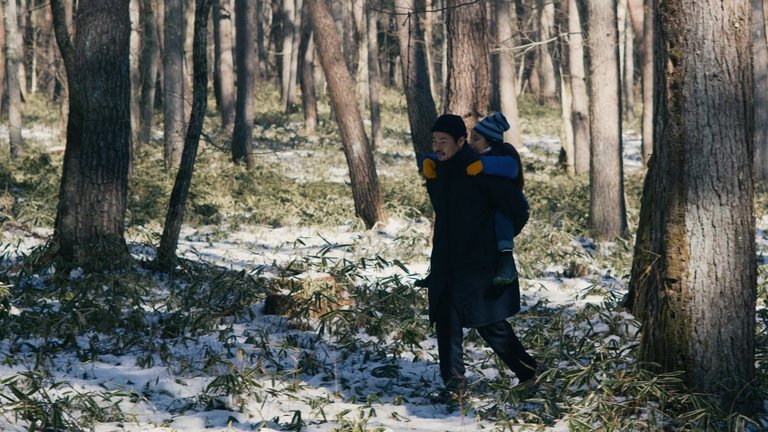
One thing that caught my attention was that the music in the film was abruptly interrupted on a couple of occasions in the middle of a scene. The first time it throws you off a bit because it's not the norm, but the second time you notice it you know it's completely intentional and the director must be trying to say something. That's why the ending isn't so abrupt - although the story ends before certain events we expected happen - because Hamaguchi was preparing us for such a sharp ending.
Algo que me llamó la atención fue que la música de la película se interrumpió de manera abrupta en un par de ocasiones en medio de una escena. La primera vez te descoloca un poco porque no es lo acostumbrado, pero la segunda vez que lo notas ya sabes que es completamente intencional y que algo debe querer decir el director. Por eso, el final no resulta tan abrupto - aunque la historia termina antes de que ocurran ciertos acontecimientos que esperábamos - porque Hamaguchi nos estuvo preparando para ese cierre tan tajante.
The film that represented Japan at the last edition of the Oscars was Wim Wenders' Perfect Days and many were surprised by this choice, not because of the quality of the film (which is a gem) or the nationality of the director (German), but because they didn't choose Ryûsuke Hamaguchi's Evil Does Not Exist, a Japanese director who had previously taken home the golden statuette with his wonderful Drive My Car. It's true that this other film, based on a story by Haruki Murakami, is a bit more complex, longer and, if you like, more ambitious, but the simplicity of Evil Does Not Exist is not a defect but another point in its favour. People have used adjectives such as subtle, sublime, simple, and I think they are appropriate because Hamaguchi shows more than he tells, tells more than he says and transmits an entire ecological message and a social and economic critique, making use of few characters and optimising the narrative resources of the seventh art. I already have other works by the author on my list, such as Wheel of Fortune and Fantasy and the extensive Happy Hour (which lasts more than five hours) but I would like to know if any of you know anything else by this Japanese director that you would like to recommend to me. Have you seen Evil Does Not Exist? What did you think? I'll read you in the comments.
La película que representó a Japón en la última edición de los premios Oscars fue Perfect Days de Wim Wenders y muchos se sorprendieron de tal elección, no por la calidad de la película (que es una joya) ni la nacionalidad del director (alemán), sino por no haber escogido Evil Does Not Exist de Ryûsuke Hamaguchi, director nipón que se había llevado previamente la estatuilla dorada con su maravillosa Drive My Car. Es cierto que esa otra película, basada en un relato de Haruki Murakami, es un poco más compleja, más extensa y si se quiere más ambiciosa, pero la sencillez de Evil Does Not Exist no es un defecto sino otro punto a favor. Las personas han utilizado calificativos como sutil, sublime, simple, y me parecen apropiados porque Hamaguchi muestra más de lo que cuenta, cuenta más de lo que dice y transmite todo un mensaje ecológico y una crítica social y económica, haciendo uso de pocos personajes y optimizando los recursos narrativos del séptimo arte. Ya tengo en lista otras obras del autor, como Wheel of Fortune and Fantasy y la extensa Happy Hour (que dura más de cinco horas) pero me gustaría saber si alguno de ustedes conoce algo más de este director japonés que me quiera recomendar, ¿ya vieron Evil Does Not Exist? ¿qué les pareció? Los leo en los comentarios.
Reseñado por @cristiancaicedo
Other posts that may interest you | Otros posts que pueden interesarte:
 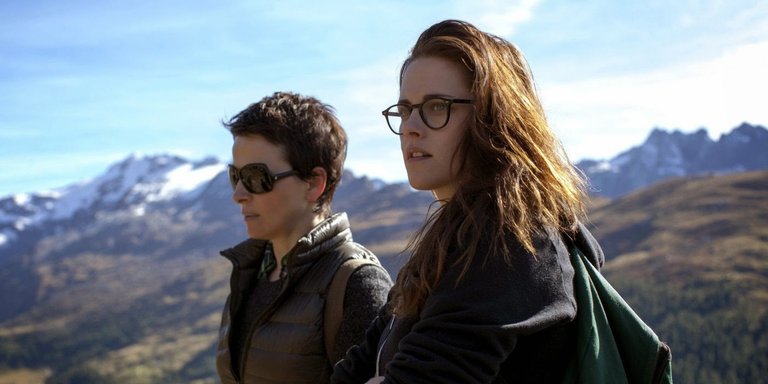 |
|---|
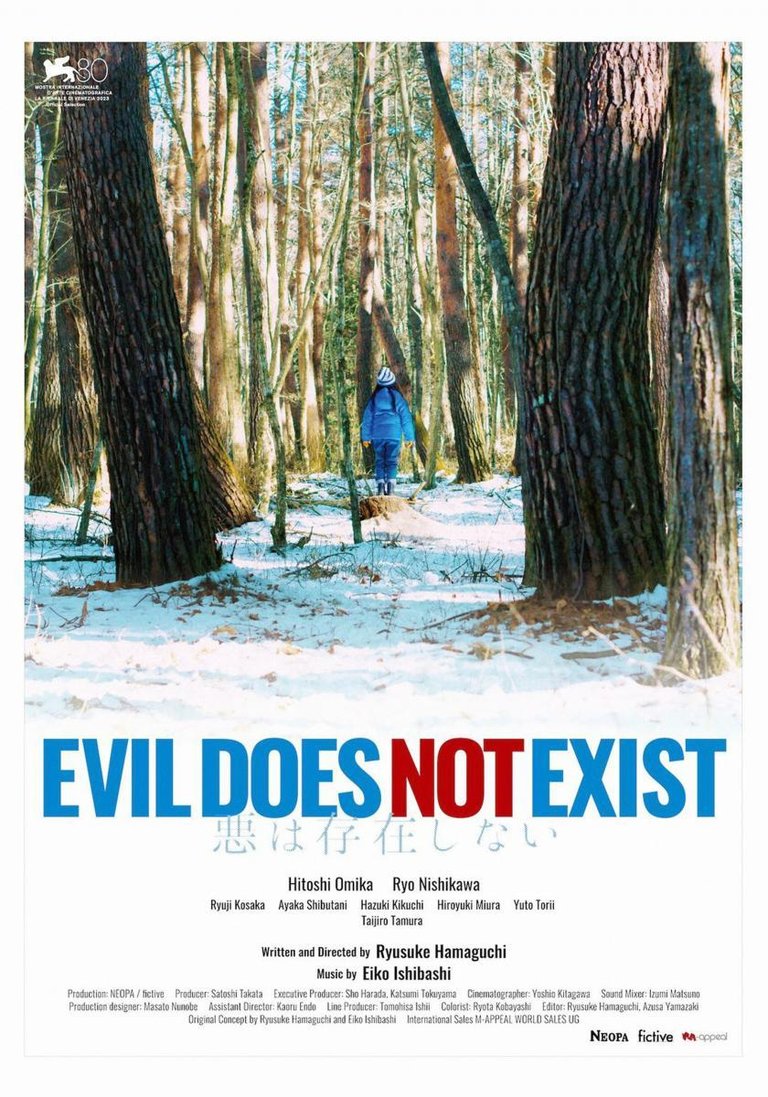
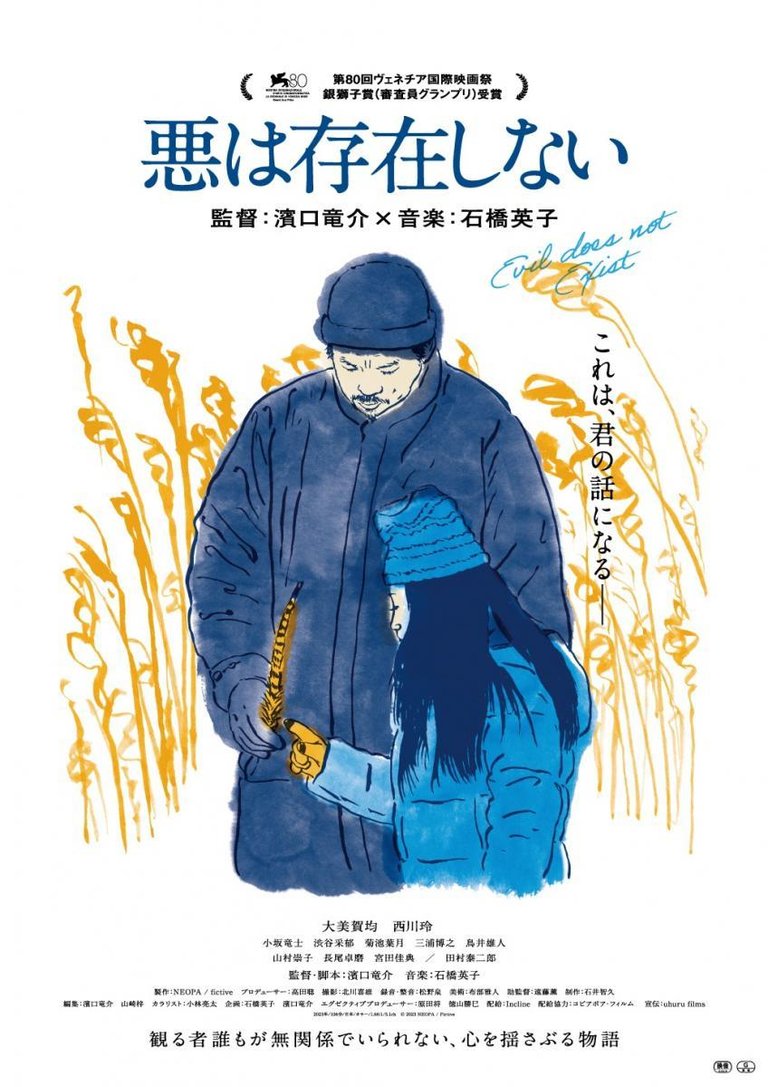
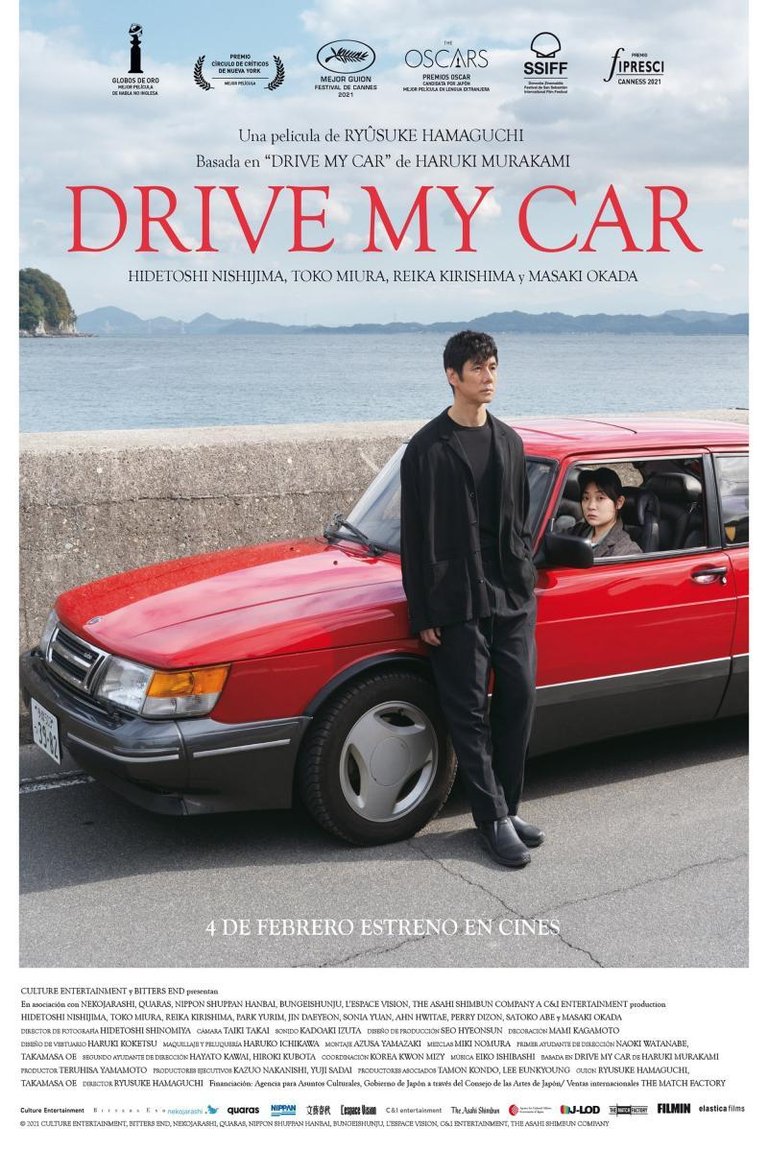
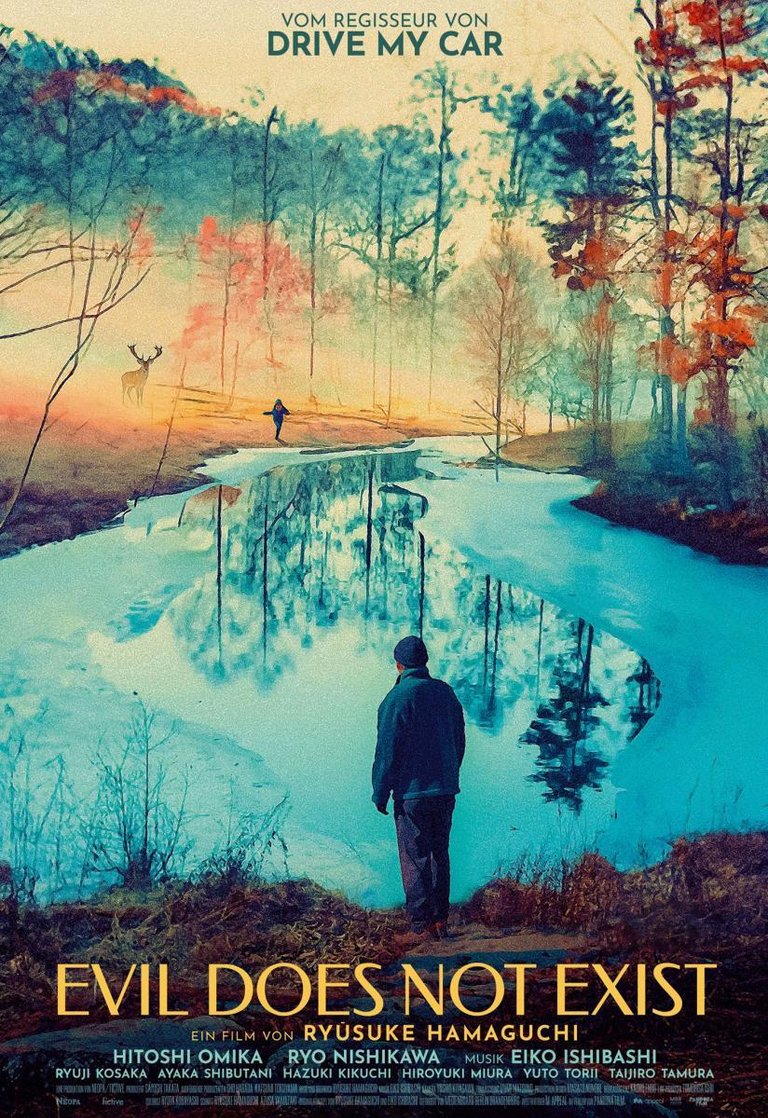
Has sido votado por
PROYECTO ENLACE
'Conectando Ideas y Comunidades'
PROYECTO ENLACE es un proyecto de curación de habla hispana enfocado en recompensar contenido de calidad y apoyar autores en su proceso de crecimiento en HIVE.
Creemos y apostamos por el futuro de esta gran plataforma, y estamos muy emocionados de poder hacerla crecer junto a esta comunidad. Así que te invitamos a publicar en nuestra COMUNIDAD y estar atento a todas las actividades que tenemos preparadas y que estaremos publicando en breve.
¿QUIERES AUTOMATIZAR TUS GANANCIAS DE CURACIÓN? SE PARTE DEL PROYECTO ENLACE APOYANDO A NUESTRO TRAIL EN HIVE.VOTE INGRESA AQUÍ PARA CONOCER LOS DETALLES.
¿QUIERES INVERTIR ENLACE? DESCUBRE COMO HACERLO Y GENERAR INGRESOS DE FORMA SEMANAL MEDIANTE TU DELEGACIÓN DE HP AQUÍ TE EXPLICAMOS COMO.
Te invitamos a participar en nuestro servidor de Discord: https://discord.gg/3S9y7BbWfS
Atentamente
EQUIPO ENLACE 2024
¡Felicidades! Esta publicación obtuvo upvote y fue compartido por @la-colmena, un proyecto de Curación Manual para la comunidad hispana de Hive que cuenta con el respaldo de @curie.
Si te gusta el trabajo que hacemos, te invitamos a darle tu voto a este comentario y a votar como testigo por La Colmena.
Si quieres saber más sobre nuestro proyecto, te invitamos a acompañarnos en nuestro servidor de Discord.
It certainly left me wanting to see the movie to experience those sensations you speak of. Thanks for the recommendation! 👍